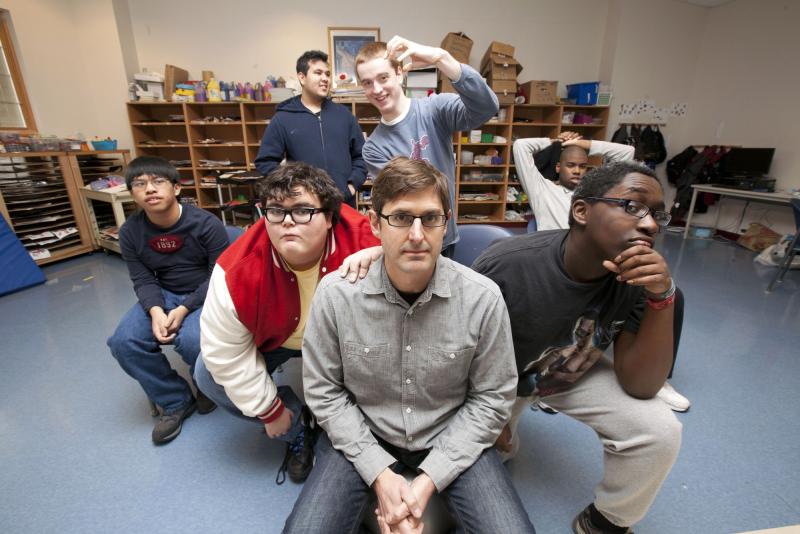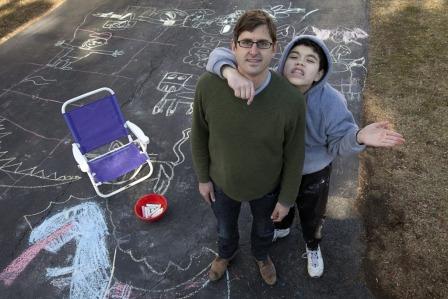Louis Theroux: Extreme Love, BBC Two | reviews, news & interviews
Louis Theroux: Extreme Love, BBC Two
Louis Theroux: Extreme Love, BBC Two
An eye-opening film about autism merits a more mature approach from Theroux

In Louis Theroux: Extreme Love, a film about the realities of looking after children with autism, a mother of twin girls from New Jersey confessed: “I just try and make them happy because, God forgive me, I don’t get a lot of enjoyment from them.” Meanwhile Josephine, the relentlessly cheery mother of 20-year-old Brian, remarked: “To be afraid of your child is a terrible thing.”
Brian’s extreme autism had caused him to burn down the family home at the age of eight, and repeatedly attack his mother, pulling her hair out in clumps. On one occasion he tried to strangle her so she called the police. Now he was in residential care and made day trips to see Josephine at the weekend. Her life was all the better for it.
Prejudice used to be a prerequisite for a Theroux documentary, as much among its viewers as its subjects. The porn stars, neo-Nazis and religious zealots that inhabited his earlier films invited instant judgement that was invariably relaxed as the presenter found the humanity lurking beneath. But now Theroux seems to have moved into a more mature phase, alighting on subjects with little comic potential and which leave no doubt as to where our sympathies should lie.
Nicky looked up Theroux on his computer. 'This is Louis' he told a friend. 'He’s popular in the UK. He has a Wikipedia page!'
Certainly, no one was judging Josephine for shipping off her son to the care of professionals during the week, least of all Theroux. The presenter’s intimidation in the face of Brian, a hulking man-child whose verbal communication came in grunts, was palpable, though with time and persistence he found him to be social and capable of affection. There was a wonderful moment where, in the car with Josephine, Brian and Louis finally seemed to make a connection, the pair of them dancing self-consciously in their seats to the music on the radio.
Theroux’s gaucheness is his stock in trade, and it was all present and correct here. But while some might say that asking a mother if her child’s autism made her love him any less might reveal the presenter to be lacking a few social skills himself, you had to applaud him for asking the questions that most of us had been thinking (the answer, in this case, was no).
 Visiting various families, Theroux was exposed to a range of extreme behaviours from prolonged shrieking to the pushing and punching of parents. As 13-year-old Joey (pictured right) lashed out and was calmly and methodically pinned to the floor by his parents, Theroux offered to step out of the room but Joey’s mother declined. She wanted people to know exactly what she was up against.
Visiting various families, Theroux was exposed to a range of extreme behaviours from prolonged shrieking to the pushing and punching of parents. As 13-year-old Joey (pictured right) lashed out and was calmly and methodically pinned to the floor by his parents, Theroux offered to step out of the room but Joey’s mother declined. She wanted people to know exactly what she was up against.
There were moments of levity too, the best being when Nicky, a bright and voluble 19-year-old, looked up Theroux on his computer. “This is Louis” he told a friend. “He’s from the BBC and he’s popular in the UK. I’m not kidding. He has a Wikipedia page!” Nicky was a student at New Jersey’s pioneering Developmental Learning Center which provided one-to-one tuition to autistic youngsters, and had a corridor that was built to look like a high street, complete with artificial shops, to help the children get used to life in the real world. Exercises that involved sorting foodstuffs into different boxes seemed to suggest that, for many of them, stacking shelves was the most likely career path.
It was an eye-opening film in part because you saw how many of these children could thrive in a sympathetic, trained environment, but also because it offered a candid account of the challenges faced by parents with no outside help. Theroux avoided glib conclusions in what was essentially a study of love, loyalty and the duty of parenthood – a duty that sometimes meant putting your child in the care of someone else.
Explore topics
Share this article
Add comment
The future of Arts Journalism
You can stop theartsdesk.com closing!
We urgently need financing to survive. Our fundraising drive has thus far raised £49,000 but we need to reach £100,000 or we will be forced to close. Please contribute here: https://gofund.me/c3f6033d
And if you can forward this information to anyone who might assist, we’d be grateful.

Subscribe to theartsdesk.com
Thank you for continuing to read our work on theartsdesk.com. For unlimited access to every article in its entirety, including our archive of more than 15,000 pieces, we're asking for £5 per month or £40 per year. We feel it's a very good deal, and hope you do too.
To take a subscription now simply click here.
And if you're looking for that extra gift for a friend or family member, why not treat them to a theartsdesk.com gift subscription?
more TV
 Murder Before Evensong, Acorn TV review - death comes to the picturesque village of Champton
The Rev Richard Coles's sleuthing cleric hits the screen
Murder Before Evensong, Acorn TV review - death comes to the picturesque village of Champton
The Rev Richard Coles's sleuthing cleric hits the screen
 Black Rabbit, Netflix review - grime and punishment in New York City
Jude Law and Jason Bateman tread the thin line between love and hate
Black Rabbit, Netflix review - grime and punishment in New York City
Jude Law and Jason Bateman tread the thin line between love and hate
 The Hack, ITV review - plodding anatomy of twin UK scandals
Jack Thorne's skill can't disguise the bagginess of his double-headed material
The Hack, ITV review - plodding anatomy of twin UK scandals
Jack Thorne's skill can't disguise the bagginess of his double-headed material
 Slow Horses, Series 5, Apple TV+ review - terror, trauma and impeccable comic timing
Jackson Lamb's band of MI5 misfits continues to fascinate and amuse
Slow Horses, Series 5, Apple TV+ review - terror, trauma and impeccable comic timing
Jackson Lamb's band of MI5 misfits continues to fascinate and amuse
 Coldwater, ITV1 review - horror and black comedy in the Highlands
Superb cast lights up David Ireland's cunning thriller
Coldwater, ITV1 review - horror and black comedy in the Highlands
Superb cast lights up David Ireland's cunning thriller
 Blu-ray: The Sweeney - Series One
Influential and entertaining 1970s police drama, handsomely restored
Blu-ray: The Sweeney - Series One
Influential and entertaining 1970s police drama, handsomely restored
 I Fought the Law, ITVX review - how an 800-year-old law was challenged and changed
Sheridan Smith's raw performance dominates ITV's new docudrama about injustice
I Fought the Law, ITVX review - how an 800-year-old law was challenged and changed
Sheridan Smith's raw performance dominates ITV's new docudrama about injustice
 The Paper, Sky Max review - a spinoff of the US Office worth waiting 20 years for
Perfectly judged recycling of the original's key elements, with a star turn at its heart
The Paper, Sky Max review - a spinoff of the US Office worth waiting 20 years for
Perfectly judged recycling of the original's key elements, with a star turn at its heart
 The Guest, BBC One review - be careful what you wish for
A terrific Eve Myles stars in addictive Welsh mystery
The Guest, BBC One review - be careful what you wish for
A terrific Eve Myles stars in addictive Welsh mystery
 theartsdesk Q&A: Suranne Jones on 'Hostage', power pants and politics
The star and producer talks about taking on the role of Prime Minister, wearing high heels and living in the public eye
theartsdesk Q&A: Suranne Jones on 'Hostage', power pants and politics
The star and producer talks about taking on the role of Prime Minister, wearing high heels and living in the public eye
 King & Conqueror, BBC One review - not many kicks in 1066
Turgid medieval drama leaves viewers in the dark
King & Conqueror, BBC One review - not many kicks in 1066
Turgid medieval drama leaves viewers in the dark
 Hostage, Netflix review - entente not-too-cordiale
Suranne Jones and Julie Delpy cross swords in confused political drama
Hostage, Netflix review - entente not-too-cordiale
Suranne Jones and Julie Delpy cross swords in confused political drama

Comments
Why is this made in USA -
The political naivety of the
Is it because the schools